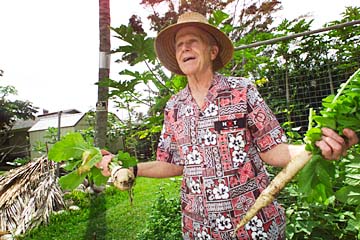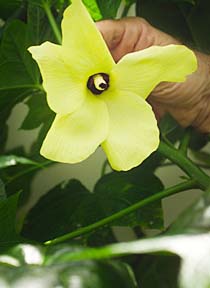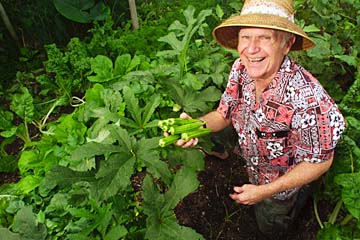


Home & Garden![]()

|
The ducks know a softy when they see one, and they were not wrong about Bill Warren. His shady garden bordering the canal in Kailua is as much a private sanctuary for the retired engineer as it is for the ownerless but tame waterfowl. Garden of eatin’
Neighborhood ducks find a feast --
and offer low-cost pest control --
at Bill Warren's Kailua vegetable gardenThe ducks roam freely in his garden. They waddle about looking for juicy bugs or nestle under the shade of the giant monkeypod tree for naps. The mother ducks build soft feather nests right next to the house and raise their young.
Warren doesn't even mind when the juvenile ducks make their way into his fenced vegetable garden once in a while and help themselves to his crop.
"They don't do any harm -- not much, anyway. Actually, they do some good. They eat bugs, and they leave a little dropping around. Their poop is good for the soil, you know," he says.
All creatures large and small, good or bad, have a place in his garden -- even the nasty fat caterpillars that crawl up his monkeypod tree in the middle of the night to devour the leaves. The caterpillars are good for one reason: extra protein for the ducks.

|
Warren has devised simple and inexpensive traps to catch the caterpillars while he sleeps. He wraps burlap around the tree branches to create convenient hiding places for the caterpillars, and in the mornings he unwraps the burlap and gathers his catch with a pair of chopsticks."I can pick 35 off the tree in one morning, and the ducks just love them," Warren says while demonstrating his ecologically friendly and efficient pest control method.
The ducks know the routine well. They rush forward and stretch their necks out for a feast.
"You see, you don't need chemicals in your garden. There are different ways to deal with pests. You don't have to go around killing everything you don't like with pesticides," Warren says.
That's the gardening philosophy Warren likes to dispense when he answers the telephone at the Urban Garden Center in Pearl City. Warren is among about a dozen dedicated volunteers trained by the center under the Master Gardener program to answers inquiries about gardening problems.
The yearlong program, part of the University of Hawaii's College of Tropical Agriculture & Human Resources, aims to provide support to the gardening public. Master Gardener volunteers answer public inquiries weekday mornings between 9 a.m. and noon. Call 453-6055. To enroll in the next program, call Jan McEwen, 453-6060.
Warren said he learned everything from plant growth to pest control and problems through the program. He's also picked up other helpful hints, such as spraying his fruits and vegetables with white vinegar and peroxide to help keep them clean.

|
Warren has been gardening since the late 1960s when he moved to Kailua. He enjoys planting vegetables to provide his family with organic produce, although he also raises orchids to provide a splash of color and fragrance around the home.WARREN'S INTEREST grew out of his father's wartime victory garden. He has learned gardening through trial and error. About 10 years ago, he enrolled in the Master Gardener program, and the tutoring has given him scientific but user-friendly information that has helped his garden thrive.
He combined the training with his own experience to create a quiet garden that he shares with the ducks, which happily aren't the variety given to loud quacking. He also has his own message about gardening, which calls for going back to the basics.
Plants need three basic things to prosper, Warren says: sunlight, water and good soil. Insecticide, herbicides and even chemical fertilizers are unnecessary. Nature has a way of finding the proper balance, and a live-and-let-live principle has worked well for him.
"When you are using chemicals, you may kill the bugs you don't like, but you are also killing some beautiful insects that do good in the garden. All insects are innocent, even the so-called pests," Warren says.
If pest infestation becomes intolerable, try spraying with a garden soap, which is less harmful to the environment. Or cut away the infested part of the plant and dispose of it in sealed garbage.
"There are all kinds of ways to deal with pests, but sometimes the best thing to do is not to do anything. Actually, there are a lot of bad things a person can do," he says.
The best thing a gardener can do for any garden is to make compost, Warren says. It recycles organic trash, is ecologically friendly and enriches the soil better than any man-made chemicals.
"Compost is like gold for the garden. It adds to the soil tremendously," says Warren, adding that it's also inexpensive and easy. Keep an eye out for biodegradable material, such as vegetable, fruit and garden trimmings for the compost pile. When he was on jury duty, he snagged several garbage bags of lawn trimmings from the courthouse for his compost piles.

|
He begins his daily gardening routine by bringing his kitchen leftovers to the compost piles, stopping briefly to share a few apple cores and banana peels with the ducks.His gardening duties require only about 15 minutes a day, which involves watering the garden and pulling a few weeds, keeping the ones with seeds for disposal later.
His vegetable garden isn't large -- only about the size of a small two-car carport -- but it is full of Chinese, Japanese and Western vegetables and herbs. He is able to grow all the vegetables his family likes to eat; only lettuce (requiring a cooler location) is absent.
"The good thing about a vegetable garden is, the vegetables are not only good to eat, but they are also very pretty. I love to look at them," he says.
But a favorite aspect of gardening, other than feasting on the harvest, is relaxing under the shade and taking in the view of the plants and frolicking ducks.
Gardening Calendar
Suzanne Tswei's gardening column runs Fridays in Today.
You can write her at the Star-Bulletin,
500 Ala Moana, Suite 7-210, Honolulu, HI, 96813
or email stswei@starbulletin.com